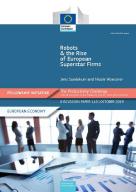Details
- Identification
- Discussion Paper 118
- Publication date
- 25 October 2019
Description
This paper analyses the impact of industrial robotics on productivity and corporate mark-ups within industries and finds that leading companies tend to benefit most, leading to a concentration of industry sales with implications for the income share of labour.
DG ECFIN's Fellowship Initiative 2018-2019 “The Productivity Challenge: Jobs and Incomes in the Dawning Era of Intelligent Robots” has solicited contributions examining current and possible future productivity developments in Europe. In view of possible hysteresis effects after the crisis and in the general context of ageing populations and globalisation, the aim has been to re-examine the ongoing trends and drivers and to identify policies to tap fully the potential for inclusive productivity growth. The fellowships have been awarded to prominent scholars in the field to interact with staff in ECFIN and other Commission colleagues, and to prepare final reports on specific research questions within this general topic.
Author(s)
Jens Suedekum, Nicole Woessner. Dusseldorf Institute for Competition Economics (DICE), Heinrich-Heine University Dusseldorf
Information and identifiers
Discussion Paper 118. October 2019. Brussels. PDF. 54pp. Tab. Graph. Bibliogr. Free.
KC-BD-19-005-EN-N (online)
ISBN 978-92-79-11186-3 (online)
ISSN 2443-8022 (online)
doi:10.2765/579528 (online)
JEL Classification: J11, O33, O47
Disclaimer
2019 Fellowship Initiative Papers are written by external experts commissioned to write research papers, retaining complete academic independence, contributing to the discussion on economic policy and stimulating debate.
The views expressed in this document are solely those of the author(s) and do not necessarily represent the official views of the European Commission.

